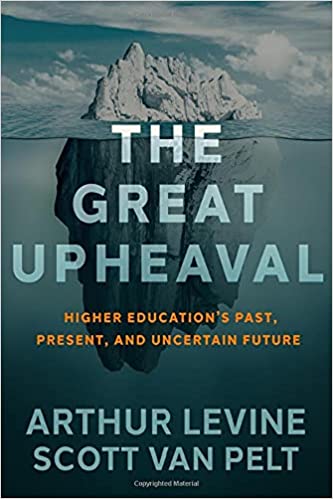[ad_1]
 The Great Upheaval: Higher Education’s Past, Present, and Uncertain Future by Arthur Levine and Scott J. Van Pelt
The Great Upheaval: Higher Education’s Past, Present, and Uncertain Future by Arthur Levine and Scott J. Van Pelt
Published in September of 2021, Johns Hopkins University Press.
Beware of allowing online learning evangelists into your traditional, residential, and research-intensive institution. Online learning people, it turns out, are hatching a secret plot.
This secret evil plan has three phases:
Phase 1: Initiate a smattering of online education programs (degree and non-degree), starting outside the core of the residential undergraduate program in graduate and professional schools.
Phase 2: To develop these new online programs, prioritize the recruitment of experts in learning science such as instructional designers and other non-faculty educators who collaborate closely with faculty on online course and program development.
Phase 3: Apply the same research-based learning science principles and faculty/non-faculty collaborations utilized in online programs to residential teaching and learning, focusing first on larger enrollment gateway and other introductory courses.
In this conspiracy, online education is a means to an end of institutional transformation. That transformation is to shift traditional residential education from teacher to learner-centric and to put learning science at the core of instructional practices.
Creating new online education programs at traditional residential research-intensive institutions is a good lever for academic transformation, but it is not enough. What is most important is to gain traction in the campus marketplace of ideas.
The humans who work at our universities need to believe in the necessity of transformation and the efficacy of placing learning and learning science at the heart of change.
This is where Levine and Pelt’s The Great Upheaval comes in.
Neil Gaiman once said, “A book is a dream that you hold in your hand.” The Great Upheaval is a dream of a different sort of university.
The future of the university that Levine and Pelt envision is one where:
- “Higher education will be based on learning and outcomes.”
- “Assessment will become largely formative, real time, and individualized….”
And my favorite quote from the book:
- “The higher education faculty…will be diversified to include learning designers, instructors, assessors, technologists, and researchers..” (Page 232-233)
The Great Upheaval provides a roadmap for those institutions wishing to proactively chart their long-term paths to designing the university of the 21st century. The authors create this map by using the effective technique of looking backward, sideways, and forward.
The backward view contextualizes the future transformation of higher education in past large-scale changes. Learning the history of how our postsecondary system evolved is necessary to assure us that large-scale change is possible and to remind us of the pitfalls that lay ahead.
The sections of The Great Upheaval that I most enjoyed were those on looking sideways. Chapters on the transformation of the music, film, and newspaper industries provide insights into what the higher education industry will likely look like in the decades to come.
The impossibility of resisting the shift from analog to digital becomes clear from these sideways glances. Incumbents will use every mechanism available to avoid changing what has always worked, ranging from denial to lawsuits. The end result still ends up being a change from records to streaming, paper circulation to apps, and theaters to digital platforms.
Levine and Pelt are convinced that higher education will become digitized, a process that will both supplant and support existing analog (residential, face-to-face) programs. Smart institutions will find ways to have digital learning complement campus programs to provide more choice for learners and greater resiliency for colleges and universities.
The Great Upheaval joins a chorus of book-length arguments (many published by JHU Press, including my own co-authored book with Eddie Maloney, Learning Innovation and the Future of Higher Education) to situate learning and the learner at the center of university design and institutional strategy.
Coming out of the pandemic (hopefully), the time is now to have wide-ranging campus conversations about the future of our institutions.
An ideal way to generate smart campus discussions – ones that avoid the traps of ahistoricism or faddish techno-boosterism (no, VR will not “revolutionize higher ed”) is to book club with the right book.
The Great Upheaval is that right book.
What are you reading?
[ad_2]
Source link

